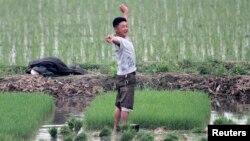North Korea’s agricultural output growth rate is the lowest in Asia, a recent study found.
A report by the International Food Policy Research Institute, a Washington private research group, said North Korea’s agricultural output growth rate was minus 0.8 percent between 2007 and 2012, making North Korea the only country in Asia with decreased agricultural output during the time period.
The research group measured the total output of crop and livestock products from 18 developing counties in Asia, using data from the U.N.’s Food and Agriculture Organization.
“Of course, [the] negative number means that there has been poor agriculture performance in North Korea. With those negative numbers, they produced less than previous years,” Alejandro Nin Pratt, IFPRI research fellow and author of the report, said in a phone interview with the VOA Korean service this week.
Other indicators also showed poor performance by the communist country.
According to the report, North Korea’s land productivity, gross production per hectare of agricultural land measured in U.S. dollars, was estimated at $1,532 in 1990, but the number fell to $1,517 in 2005, and fell again to $1,450 in 2012.
“The evolution of land productivity in North Korea since 2000 is very flat. By 2012, land productivity in South Korea was four times bigger. Or, putting it differently, land productivity in North Korea in 2012 was almost the same or a little bit higher than land productivity in South Korea in 1961,” Pratt said.
Recently, there were some signs of improvement in the country. Last month, the GS & J Institute, a private South Korean agricultural think tank, said the country had harvested 4.98 million tons of crops in 2014, the highest since the mid-1990s. Hyundai Research Institute, another think tank in South Korea, projected Pyongyang’s economy could grow by 7.5 percent this year, thanks to increased harvests.
Jee Abbey Lee contributed to this report.
